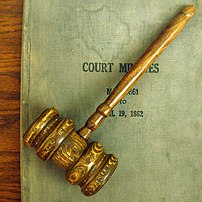Legal Scholarship, Electronic Publishing, and Open Access
By Kristopher A. Nelson
in
February 2009
400 words / 2 min.
Tweet
Share
Image via Wikipedia SSRN-Legal Scholarship, Electronic Publishing, and Open Access: Transformation or Steadfast Stagnation? by Stephanie Plotin: Abstract: This article uses a social shaping of technology perspective, which studies the complex interactions between technology and the culture of a discipline, to investigate the evolution of legal scholarship in the digital age, and to determine how […]
Please note that this post is from 2009. Evaluate with care and in light of later events.

Abstract:
This article uses a social shaping of technology perspective, which studies the complex interactions between technology and the culture of a discipline, to investigate the evolution of legal scholarship in the digital age, and to determine how the open access movement has influenced various forms of legal scholarship, particularly law reviews, their online companions, and legal blogs.
An interesting look at open access in the law journal context:
A sociotechnical or social shaping of technology perspective is helpful in
explaining how technology and electronic publishing have impacted scholarly legal
communication. Those taking an information-processing view, focusing on the
technical features of electronic media, have either predicted sweeping changes that
have not come to pass or are advocating the adoption of technical changes without
considering the existing academic culture. In contrast, a focus on scholarly legal
culture and the institutions and participants interacting within it explains why
certain things (law reviews) have mostly stayed the same, while other forms (electronic repositories, legal blogs) have embraced the possibilities of the available
technology. Technology influences legal scholarship and culture, legal scholarship
and culture influence technology, and the results require an understanding
of both.
The article includes a discussion about legal blogs:
Just as specialized law reviews provided a forum for “outsider scholar-
ship,” legal blogs provide an electronic forum for discussions about topics such as
critical race theory, affirmative action, feminism, and sexual orientation law. These blogs can provide a virtual community where scholars can connect and
express views that are not well represented in mainstream legal publications, in
addition to connecting with a wider community of readers. . . . Finally, the popularity of legal blogs can be seen as an indicator of larger
changes in legal scholarship.
See also:
- Plotin on Open Access at the Legal Theory Blog by Lawrence Solum
Related articles by Zemanta
- Social Science Research Network (SSRN) (inpropriapersona.com)
- Another Attempt to Repeal Open Access (inpropriapersona.com)
- Peter Suber on the future of open access (hyperorg.com)
- Law libraries ask for open access (hyperorg.com)
![Reblog this post [with Zemanta]](http://img.zemanta.com/reblog_c.png?x-id=c55fbfe8-d078-4269-b52f-9797c59d95f8)